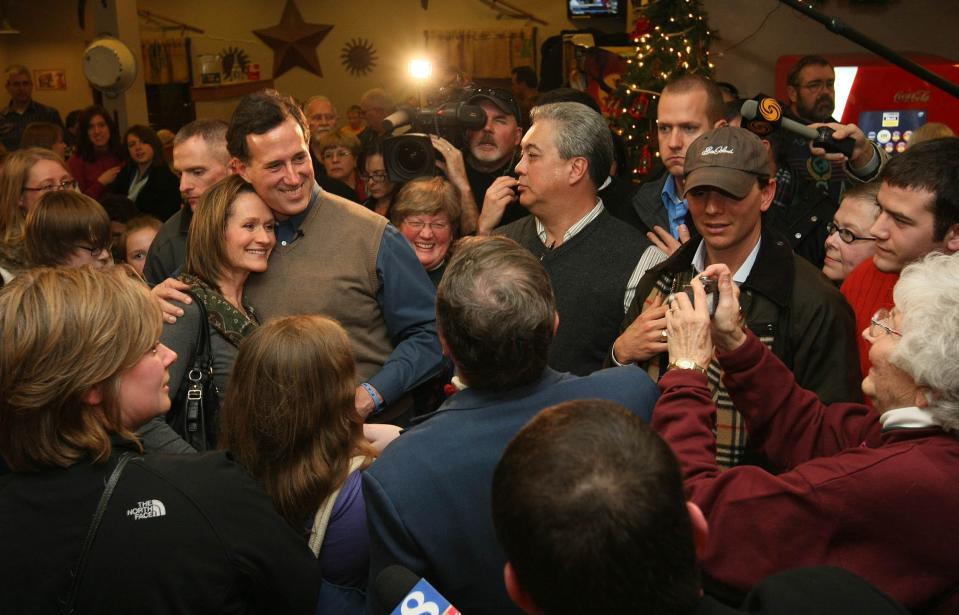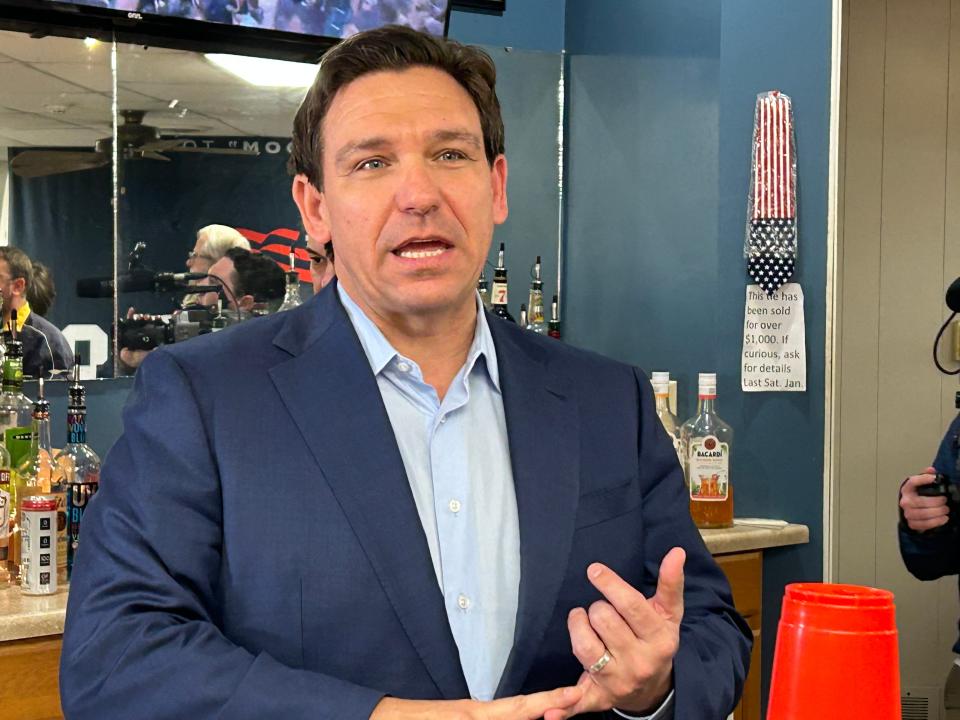DeSantis says Iowa Caucus polling is 'never accurate.' We checked. Here's what we found:
- Oops!Something went wrong.Please try again later.
The latest Des Moines Register/NBC News/Mediacom Iowa Poll released Monday was a very good one for former President Donald Trump.
Strengthening his already overwhelming lead ahead of January's Iowa Caucuses, Trump now has the support of a majority of likely Republican caucusgoers in Iowa — more than 30 percentage points higher than his nearest challenger, Florida Gov. Ron DeSantis.
But DeSantis shrugged off the poll results when speaking to reporters Monday.
"They do these polls, they’re never accurate with the caucus, because it’s all about turning out the folks and then everyone you turn out they bring a neighbor, they bring a family member and then you get a great crescendo of support on caucus night," DeSantis said in Dubuque.
Is DeSantis right?
Polls are a snapshot, not a forecast
The nature of the Iowa caucuses — party-run, local gatherings — makes polling particularly difficult, J. Ann Selzer, president of Selzer & Co., which conducts the Iowa Poll, readily acknowledges.
"Caucus polling is probably the hardest type of election-related polling there is," Selzer said. "There is no polling partnership that spends more time or more money to take our best shot."
What's important to remember is that a poll is a snapshot, not a forecast. It indicates how caucusgoers feel now, not a month from now.
While candidates with large leads certainly appear to have better odds of winning, circumstances can and do change between the poll and caucus night. Throughout the history of the Iowa Caucuses, there's no shortage of winning candidates who surged late.
And Iowa caucusgoers are notorious for making up their minds late, or changing them, as Caucus Day approaches.
"We’ve seen things happen in the final days that could not have been predicted," Selzer said. "That’s sort of the design and the charm of caucuses."
The better question to ask, then, may be: How often do candidates who are ahead in the Iowa Poll go on to win the caucuses? And when they don't, why not?
At a month out, the Iowa Poll can be a reliable forecast of victory
Yes, we know we just said polls are not designed to be forecasts, but it's true that candidates who lead the Iowa Poll about a month ahead of the caucuses typically do go on to win on caucus night.
The Iowa Poll has conducted polling ahead of every Iowa Caucus since 1984. Of the 14 presidential nominating contests that have taken place at those caucuses, the leading candidate in the latest Iowa Poll in the month before caucus night has gone on to win — with some rare exceptions.
While some candidates have managed to make up deficits of more than 10 points in the final month of the caucuses — notably Rick Santorum in 2012, climbing back from fourth — no candidate with a double-digit lead over second place has gone on to lose the caucuses.
Trump's lead of 32 points at this point in the caucus cycle is larger than every other winner since 1984, with the exception of Tom Harkin in 1992. (Harkin, then a U.S. senator from Iowa, was playing with a home-field advantage.)
Rick Santorium is the patron saint of trailing Iowa Caucus candidates
Santorum's victory is the example trailing candidates like to call on to say they're not out of the race.
Other comeback wins included candidates who at one time led in the polls (Pete Buttigieg in 2020) or had hung around as part of a closely bunched pack of front-runners (John Kerry in 2004).
One month before the 2012 caucuses, Santorum was polling at 6%. Even so, that was an improvement over his previous showings, and his surge was beginning to materialize.

In another Iowa Poll just before the caucuses, he jumped to 15%, leapfrogging previous leader Newt Gingrich. And on caucus night, Santorum pulled ahead of Romney and Ron Paul.
Key groups needed for comeback leaning toward Trump
The rest of DeSantis' quote on Monday — "it's all about turning out the folks," and so on — aligns with conventional caucus wisdom.
Earning the votes of those groups of undecided voters and first-time caucusgoers is a tried-and-true path toward outperforming expectations.

It's easier said than done.
In December's Iowa Poll, nearly two-thirds of those Iowa Republicans likely to caucus for the first time this cycle said their first choice is Trump. His lead over DeSantis among those likely first-time caucusgoers is more than 50 points.
Siphoning votes from Trump may be difficult. Seventy percent of likely Republican caucusgoers who name Trump as their first choice say their mind is made up, leaving just 30% who say they could be persuaded to support someone else.
Even so, majorities of likely caucusgoers say they are still at least actively considering DeSantis and Nikki Haley, who is 3 points behind DeSantis in the December Iowa Poll. The door may still be open for one of the two to make a Santorum-style surge.
Tim Webber is a data visualization specialist for the Register. Reach him at twebber@registermedia.com, and on Twitter at @HelloTimWebber.
This article originally appeared on Des Moines Register: DeSantis says Iowa Caucus polls are 'never accurate.' Our fact check.

